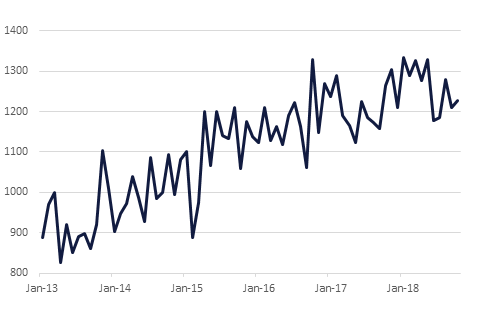.jpg?h=457&w=800&la=en&hash=94421D83F1902C5649035AAC2AE69E33)
Trade tensions are brewing again ahead of the G20 meeting in Buenos Aires at the end of this month when President Trump is set to meet with President Xi of China. A report from US trade representative Robert Lighthizer accused China of state-backed intellectual property and technology theft overnight ahead of his planned trip to China. Sentiment was not helped by the absence of a communique at the conclusion of the APEC Summit at the weekend because of widening tensions between the US and China. Vice President Pence criticized China's one belt-and-road initiative while pledging to ‘more than double’ tariffs on Chinese goods unless Beijing chances course. This may be a tactic by President Trump, however, to lower expectations, and thereby surprise the markets positively if a deal is announced.
The BoE's Governor Mark Carney continued to hint yesterday that rates may go up even in the case of a no deal Brexit scenario, saying that that ‘if the economy moved further into excess demand’ and ‘sterling were to depreciate at a time where we had some expectation of supply being reduced for a period of time, that's a situation where you would expect that monetary policy would be tightened’. Carney also repeated that the chances of a no-deal Brexit are ‘uncomfortably high’ nailing his colours further to the Prime Ministers’ mast. The Bank announced that it will provide an analysis of the government’s Brexit deal to the Treasury Select Committee on the 29th November, along another report anaylsing the impact of a no-deal Brexit. The government will also produce contrasting reports ahead of the planned parliamentary vote on May’s deal in December.
Meanwhile a report from the CBI showed that Manufacturing Orders rose to 10 in November compared with -6 in October. The same report showed that the output volume for the 3 months to November accelerated to 18 from 13 in October. The data echoes other recent reports that show the British economy in good shape approaching Brexit.

Contrary to recent trend, Treasuries were steady in yesterday’s trading despite wide sell-off in equities and commodities. The flight to quality trade has not picked up speed in this bout of risk sell-off. The curve flattened slightly. Yields on the 2y UST, 5y UST and 10y UST closed at 2.80% (+1 bp), 2.88% (+2 bp) and 3.06% (flat).
Regional bonds continued to drift lower amid sustained weakness in oil prices. The YTW on the Bloomberg Barclays GCC Credit and High Yield index rose +3 bp to 4.76% and credit spread widened +3 bps to 189 bps.
USD experienced range bound trading on Tuesday after rebounding from a two week low caused by investors questioning the pace of tightening of monetary policy from the Federal Reserve. Among the G-10 currencies NZD outperformed and gained on the other major currencies after data from Dairy Companies Association of New Zealand showed that production rose by 6.5% y/y in October 2018.
Elsewhere, the AUD continues to find itself under pressure in the aftermath of the RBA minutes which highlighted concerns on trade tensions to global growth and stated that there was no justification to raise interest rates in the near future. The USD and JPY are broadly firmer this morning as trade worries and Brexit are sparking risk aversion amidst concerns over global growth and pressure on global equities.
The sell-off in equity markets deepened as weak economic data from the US added to concerns over global economic growth. Retail sector stocks joined technology stocks to drive US equities into negative territory for the year. The S&P 500 index lost -1.8%. European equities were not too far behind either with the Euro Stoxx 600 index losing -1.1%.
It was a negative day of trading for regional equities. The Tadawul and the DFM index lost -0.7% and -1.2% respectively. Market heavyweights across indices closed lower as investor’s trimmed positions. . Etisalat and FAB lost -2.2% each while Qatar National Bank declined -3.4%.
Crude oil has resumed its slide, briefly reaching levels last seen in March. Supply concerns due to the imposition of U.S. sanctions on Iranian oil exports have been watered down, weighing on prices, as waivers to Iran customers such as India, South Korea, and Taiwan will allow those nations to continue to purchase, at least for now, Iranian oil.